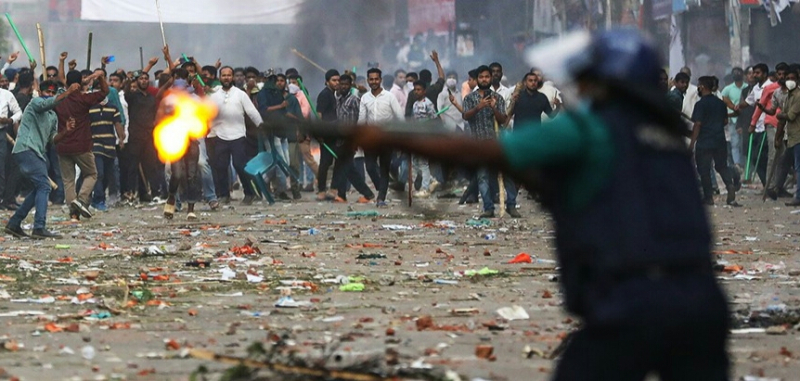- Death toll from central Israel strike rises to 5 |
- DSE sinks 138 points on broad sell-off; CSE also tumbles |
- Inside story of a roommate murder after quarrel in Dhaka |
- Jamaat condemns Khamenei’s killing, holds protest rally in Dhaka |
- Iran to pick next supreme leader in ‘one or two days’ |
Political Violence in Bangladesh: Human Rights Watch

Violence at Saturday rally of the opposition.
Saturday was a grim day in Bangladesh, and many fear things will get worse.
Political protests descended into deadly violence, with at least 11 people, including two police officers, killed, and hundreds injured.
Witnesses accuse Bangladesh police of using unnecessary force against demonstrators, and while violence was committed on all sides, what happened was clearly part of a continuing police crackdown on the political opposition.
Tensions have been rising as national elections approach in January, pitting supporters of the governing Awami League under Prime Minister Sheikh Hasina against those of the opposition Bangladesh Nationalist Party (BNP).
The government has arrested thousands of opposition members, including the secretary-general of the BNP, and sealed the party’s offices. Authorities have increasingly carried out arbitrary mass arrests over the last year, and at least 1,500 opposition members were arrested in the days leading up to Saturday’s rally.
It all looks like a coordinated effort to stifle the opposition ahead of the January polls. The mass arrests appear to reflect orders from police officials to systematically arrest and convict opposition members to disqualify them from running in the elections.
Some say they were tortured in detention.
With a threatened further escalation in violence amid the government’s crackdown, Bangladesh is facing a key moment. How other governments respond right now could be critical.
As my colleague and expert Meenakshi Ganguly says: “Bangladesh’s international partners should insist that elections cannot be considered fair when the opposition is targeted, harassed, and behind bars.”
There has been some concern globally. The EU in September said it would not send a full election observer mission due to fears over the lack of a free and fair vote. In the same month, the US said it would “impose visa restrictions on Bangladeshi individuals responsible for, or complicit in, undermining the democratic election process in Bangladesh.”
Following Saturday’s events, the UN Office of the High Commissioner for Human Rights called on “all political actors to make clear that such violence is unacceptable and to avoid any statements or actions that could constitute incitement to violence.”
Thus far, unfortunately, the Bangladesh government seems to be ignoring these international calls for restraint, not to mention its own pledges to hold a peaceful, free, and fair election.
They would be wise to listen to their partners and reverse course.

